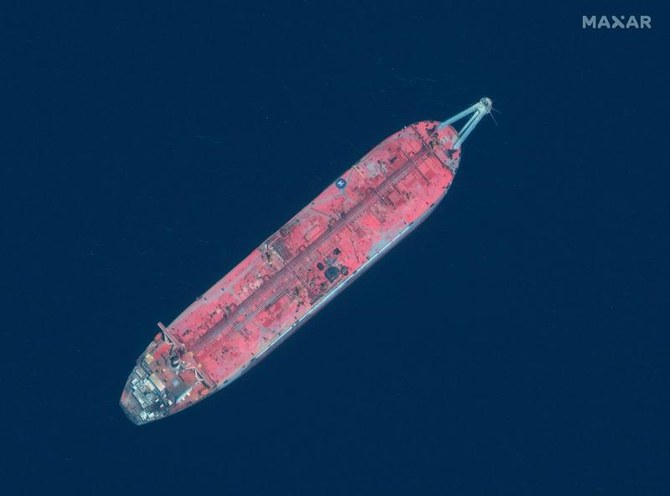https://arab.news/2kjsv
- It would also have ‘catastrophic’ environmental, humanitarian consequences for millions
- Iran-backed Houthi militia has repeatedly refused UN pleas for access to secure tanker
LONDON: Environmental activist group Greenpeace has warned of “catastrophic” humanitarian and environmental consequences if the FSO Safer tanker, currently under the control of the Iran-backed Houthi militia off the Yemeni coast, is not drained of its oil.
An oil spill or explosion from the tanker could also block the Suez Canal, costing the world nearly $10 billion per day, Greenpeace said at a press conference attended by Arab News on Thursday.
The tanker was abandoned in the Red Sea off the Yemeni coast in 2017. It holds 1.1 million barrels of oil, or around 140,000 tons, which Greenpeace said could spill into the sea “at any moment” or spread as a result of an explosion on board.
The vessel’s firefighting system is also inoperative, meaning a fire on the ship could spread vast quantities of pollution into the air if the crude ignites.
Paul Horsman, who leads Greenpeace International’s Safer Response Team, said: “Unless action is taken to make the tanker secure, there’s a real danger of a major oil spill, or possibly worse, an explosion.”
Either outcome would be “severe and long-lasting. In a worst-case scenario, the oil could drift to neighboring countries, to Djibouti, to Eritrea and Saudi Arabia,” he added.
“It could potentially disrupt shipping routes in the Suez Canal, it could impact any future tourism. If the Suez Canal is unable to function because ships can’t get out of the Red Sea, we all remember what happened when the Ever Given was blocked there — it was estimated that trade through the Suez Canal lost about $9 billion per day during that time.”
The Houthis have repeatedly refused international access to secure the FSO Safer despite multiple pleas by the UN.
According to a report released on Thursday by Greenpeace on the risks posed by the tanker, a spill would have a devastating humanitarian impact on millions of Yemenis. Perhaps most notably, access to clean water would be drastically curtailed.
“The desalination plants on Yemen’s coast at Hudaydah, Salif and Aden could be affected and that, combined with disrupted fuel supply, could disrupt the drinking water supply for up to 10 million people,” said the report.
“Yemeni fisheries (as well as those of neighboring countries) could be completely closed by an oil spill. These fisheries support 1.7 million people and closures would be necessary to ensure that no contaminated commercial fish enter the human food chain … the most serious risks are to the livelihoods of the fishing communities.”
Yemen, the poorest country in the Middle East, is already facing a humanitarian crisis following years of conflict sparked by the Houthis seizing the capital from the internationally recognized government.
While a spill or explosion appears imminent, Greenpeace stressed that action could be taken immediately to avert a disaster.
Horsman said a barrier could immediately be placed around the ship that would mitigate some of the immediate harm caused by the imminent spill.
He added that the technology exists to transfer the oil on board — still technically owned by the internationally recognized government — into another vessel. The problem, he said, is a “lack of political will” to solve the issue.

